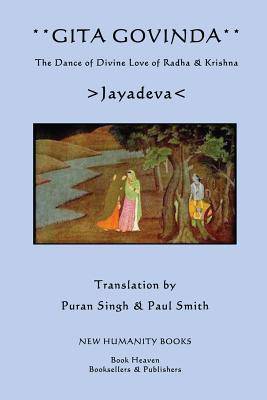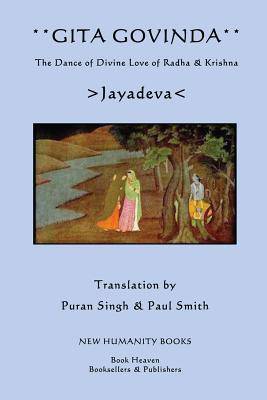
- Afhalen na 1 uur in een winkel met voorraad
- Gratis thuislevering in België vanaf € 30
- Ruim aanbod met 7 miljoen producten
- Afhalen na 1 uur in een winkel met voorraad
- Gratis thuislevering in België vanaf € 30
- Ruim aanbod met 7 miljoen producten
Zoeken
€ 29,45
+ 58 punten
Uitvoering
Omschrijving
GITA GOVINDA The Dance of Divine Love of Radha & Krishna by Jayadeva Translation by Puran Singh & Paul Smith Jayadeva (circa 1200 AD.) was a Sanskrit poet and most known for his immortal composition, the epic poem/play Gita Govinda that depicts the divine love of Avatar Krishna and his consort, Radha. This poem is considered an important text in the Bhakti (Path of Love) movement of Hinduism. The work delineates the love of Krishna for Radha, the milkmaid, his faithlessness and subsequent return to her, and is taken as symbolical of the human soul's straying from its true allegiance but returning at length to the God that created it. It elaborates the eight moods of the heroine that over the years has been an inspiration for many paintings, compositions and choreographic works in Indian classical dances. It has been translated to many languages and is considered to be among the finest examples of Sanskrit poetry. Paul Smith has worked with Puran Singh's powerful & beautiful original free-form poetic version and brought it up to date. Introduction on Life & Times & Poetry of Kayadeva. Glossary. Pages 107. COMMENTS ON PAUL SMITH'S TRANSLATION OF HAFIZ'S 'DIVAN'."It is not a joke... the English version of ALL the ghazals of Hafiz is a great feat and of paramount importance. I am astonished. Dr. Mir Mohammad Taghavi (Dr. of Literature) Tehran. "Smith has probably put together the greatest collection of literary facts and history concerning Hafiz." Daniel Ladinsky (Penguin Books author). "Superb translations. 99% Hafiz 1% Paul Smith." Ali Akbar Shapurzman, translator of many mystical works in English into Persian and knower of Hafiz's Divan off by heart. Paul Smith is a poet, author and translator of many books of Sufi poets from the Persian, Arabic, Urdu, Turkish, Pashtu and other languages including Hafiz, Sadi, Nizami, Rumi, 'Attar, Sana'i, Jahan Khatun, Obeyd Zakani, Nesimi, Kabir, Anvari, Ansari, Jami, Khayyam, Rudaki, Yunus Emre and many others, as well as poetry, fiction, plays, biographies, children's books and screenplays. amazon.com/author/smithpa New Humanity Books
Specificaties
Betrokkenen
- Auteur(s):
- Vertaler(s):
- Uitgeverij:
Inhoud
- Aantal bladzijden:
- 136
- Taal:
- Engels
Eigenschappen
- Productcode (EAN):
- 9781482751246
- Verschijningsdatum:
- 11/03/2013
- Uitvoering:
- Paperback
- Formaat:
- Trade paperback (VS)
- Afmetingen:
- 152 mm x 229 mm
- Gewicht:
- 208 g

Alleen bij Standaard Boekhandel
+ 58 punten op je klantenkaart van Standaard Boekhandel
Beoordelingen
We publiceren alleen reviews die voldoen aan de voorwaarden voor reviews. Bekijk onze voorwaarden voor reviews.











